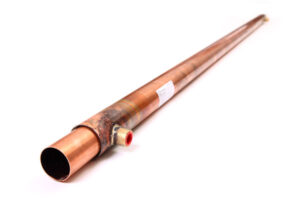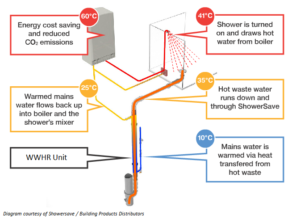Waste Water Heat Recovery (WWHR) units can help to lower CO² emissions in new homes.
They can provide a relatively low cost and low maintenance solution to lowering emissions within a Part L SAP Calculations, and unlike solar panels or other renewable technologies, many designers are unaware of what this relatively simple device is or how it works. So what is WWHR?
What is Waste Water Heat Recovery (WWHR)?
A WWHR unit is a system designed to retrieve thermal energy from hot water used in a shower before it disappears down the drain. This happens through a heat exchanger, in which cold mains water is passed around a copper waste pipe to gain a temperature rise, before continuing to the boiler ‘pre heated’. This in turn relieves the workload of the boiler.
As a system with no moving parts or maintenance routine, a WWHR unit can be considered a ‘fit and forget’ solution.
Most models resemble a length of copper piping and so can be fitted behind the scenes with little additional considerations by the builder or occupant.
Costs of WWHR
So what about cost? The most popular vertical models from Showersave and Recoh cost between £400-£1,000 to install per unit. Compared to much larger potential outlays for solar panels this makes WWHR an attractive prospect for those looking to save carbon. Manufacturers in the UK include Recoup, Showersave and Powerpipe.
Housebuilders are finding WWHR systems to be an attractive way of meeting Part L emissions targets as they are a cost effective technology which achieves significant performance gains.
WWHR Carbon Savings
Power-Pipe for example claim that adding one of their products to a SAP calculation will result in an improvement in emissions of 2-7% depending on the size of the unit. They offer 67 different SAP listed models based on two diameters (50mm or 100mm) and multiple lengths (610-2130mm).
This can equate to a cost saving, in a typical family home, of £80-£100 per year and a carbon dioxide saving of between 300kg-1000kg per year.
Do you need help with a project?
Call us on 0330 055 34 05 or email be@buildenergy.co.uk.

